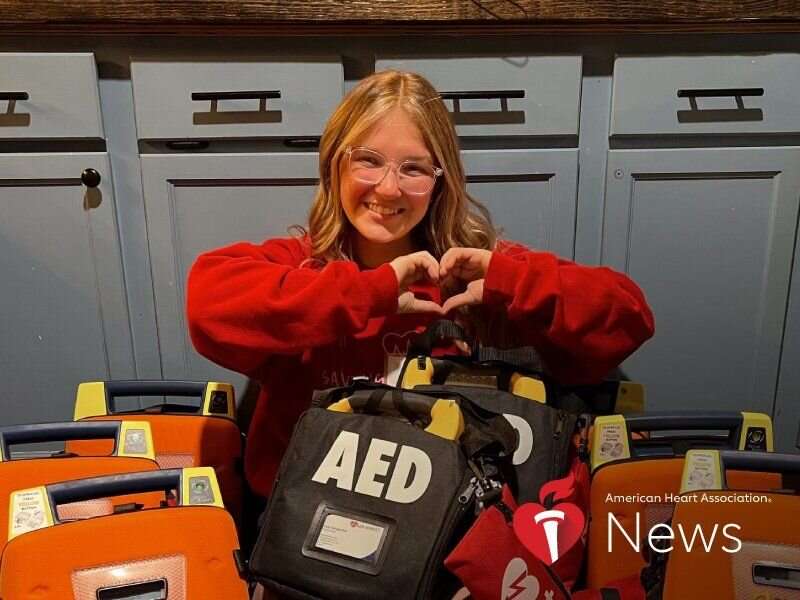This article has been reviewed according to Science X's editorial process and policies. Editors have highlighted the following attributes while ensuring the content's credibility:
fact-checked
reputable news agency
proofread
Teen with gene mutation gets rare heart operation

At school dismissal one sunny October day in Pineville, Louisiana, then-9-year-old Anniston Fairbanks was headed toward her ride home when she realized she'd left her hoodie in her classroom. She ran back inside to retrieve it.
When Anniston returned to the carpool line, she slid into the back seat of a pickup truck between her brothers, Cason, 11, and Garison, 7. Reaching for the seat belt, she felt dizzy. Then she slumped over.
Cason shook her. "You're not asleep," he said. "Stop playing."
Anniston's face turned purple. The driver, a physician's assistant, pulled her into the passenger's seat. He gave her several rescue breaths, reviving her. Then they went to the hospital.
Blood, neurological and cardiac tests showed no signs of a problem. That wasn't a good enough answer for Anniston's mother, Britain Stokes. "I knew something was wrong," she said.
She took Anniston to their family doctor. He referred them to the only local pediatric cardiologist. They saw a neurologist, too. Still, no one had answers. Six months after Anniston passed out, they drove three hours to see an electrophysiologist in New Orleans.
A stress test revealed that Anniston had an electrical problem with her heart. Genetic testing then showed she has a gene mutation linked to catecholaminergic polymorphic ventricular tachycardia, or CPVT. People with CPVT experience abnormal heart rhythms, especially when adrenaline is high, such as during or after exercise or when they have a strong emotion.
To help prevent abnormal rhythms, Anniston took a beta blocker for the next few years. She had regular checkups in New Orleans. While she often found herself struggling to catch her breath after exerting herself, she went years without passing out again.
Then, during a checkup and another stress test in 2020, 12-year-old Anniston's pulse spiked. Her heart went into ventricular tachycardia, a potentially fatal type of irregular heartbeat.
She was admitted into intensive care. Doctors implanted a defibrillator and pacemaker into her chest to keep her heart rhythm stable. She went home and felt fine for the next two years.
Last fall, she was walking with friends after a high school football game when she collapsed on the field. Her defibrillator delivered a shock, restoring a normal heartbeat. She was airlifted to New Orleans.
Despite her defibrillator and the beta blockers she was taking, doctors recommended a rare operation at Texas Children's Hospital in Houston that few hospitals in the country perform on children.
The procedure, called a left cardiac sympathetic denervation, involves removing a hormone-producing chain of nerves in the back of the chest wall to keep the heart from beating abnormally in response to the body's fight-or-flight response.
This is important because for some patients with CPVT, a defibrillator shock can lead to another abnormal heart rhythm that prompts another shock. It's a vicious cycle and a potential risk known as an arrhythmic storm.
"You can remove this nerve with very little effect on overall cardiac function and abate this response that people get," said Dr. Neil Cambronero, the surgeon who performed Anniston's surgery last fall, the fourth he's performed on a child. "The hope is it significantly decreases the number of shocks delivered by a patient's device."
Now 15, Anniston has tried leading as normal a life as possible.
She tried out for her school's softball team—and made the squad. However, one day at practice, she felt like she couldn't breathe.
"I wanted to keep pushing," she said, "but I ended up stepping back," opting to become a team manager.
Anniston often thinks about whether another frightening episode might occur. Praying and spending time with her family and goldendoodle, Luna, help.
"I've always put up a front," she said, "but this has all been scary."
She aspires to a career in health care or teaching. She and her mother also started a nonprofit to get automated external defibrillators—portable devices that can deliver a shock to restore a normal heart rhythm—into local schools. They've raised thousands of dollars to purchase equipment. It's a critical need, they say, especially in rural areas like theirs and for school sports teams when they're on the road.
After Anniston's heart issues, her brothers had genetic testing, too. Luckily, they don't have the mutation. Britain suspects her father—who died at 48 from cardiac arrest—had the mutation Anniston has.
"It's important for people to know that if you have a sudden young cardiac death in the family, you should get genetic testing," Britain said.
American Heart Association News covers heart and brain health. Not all views expressed in this story reflect the official position of the American Heart Association. Copyright is owned or held by the American Heart Association, Inc., and all rights are reserved.
Copyright © 2023 HealthDay. All rights reserved.




















